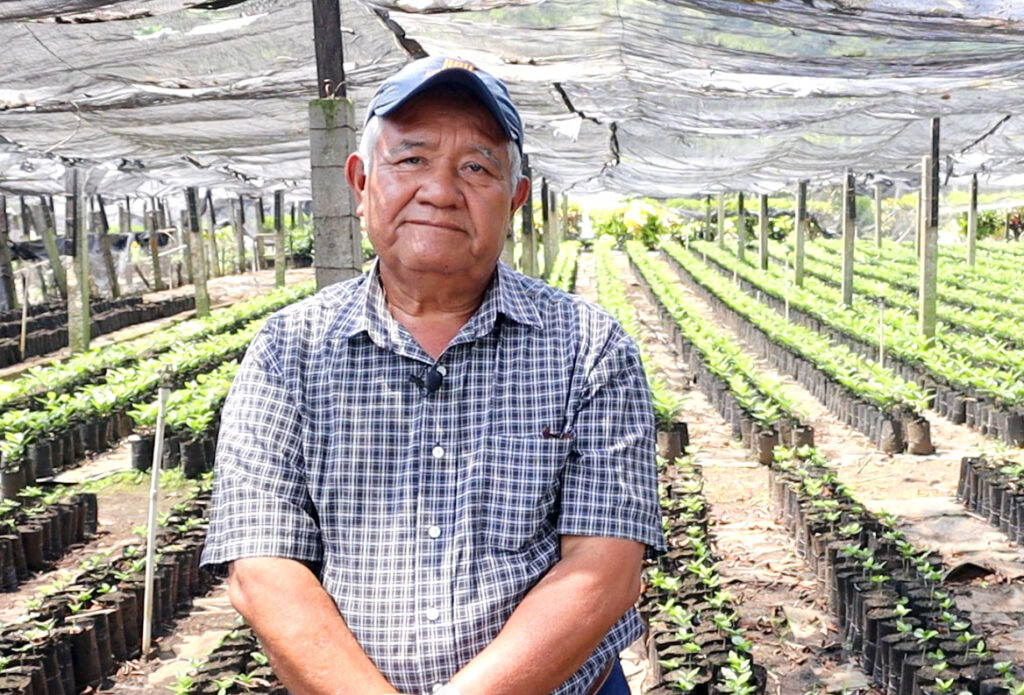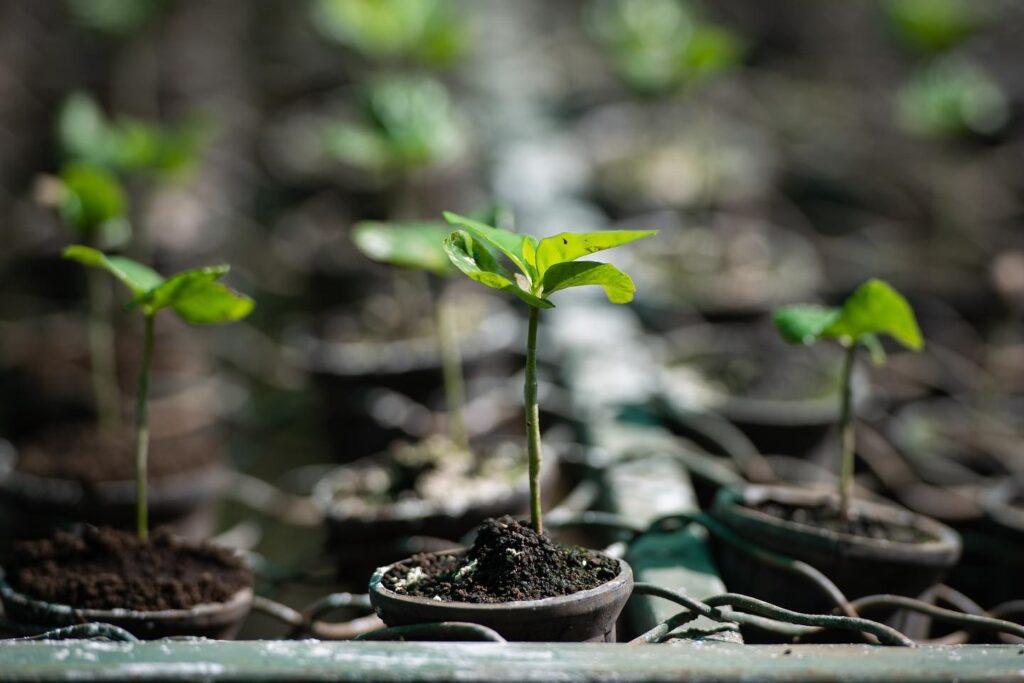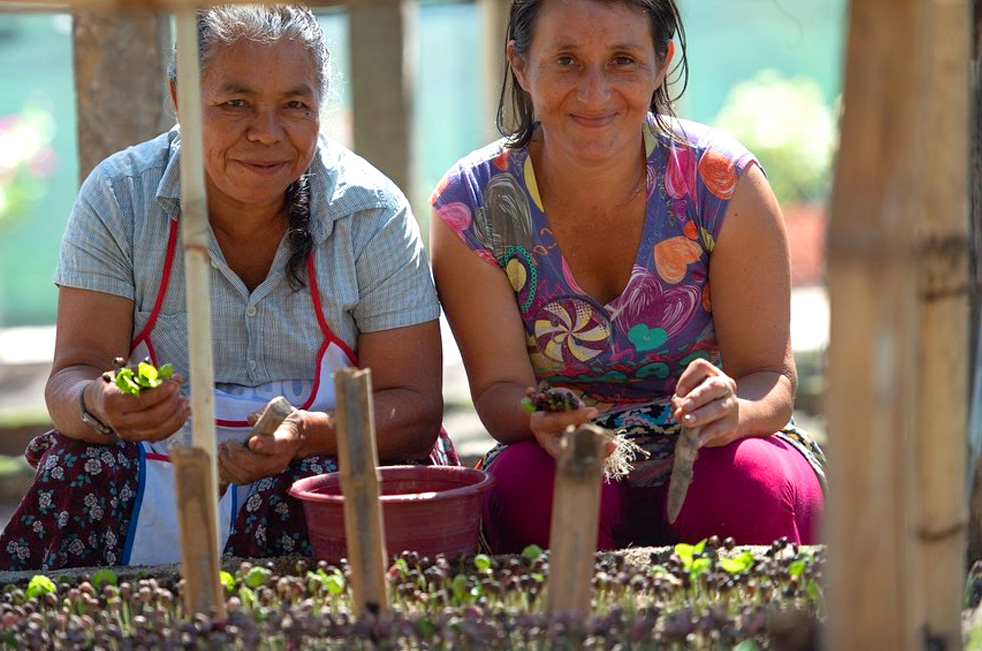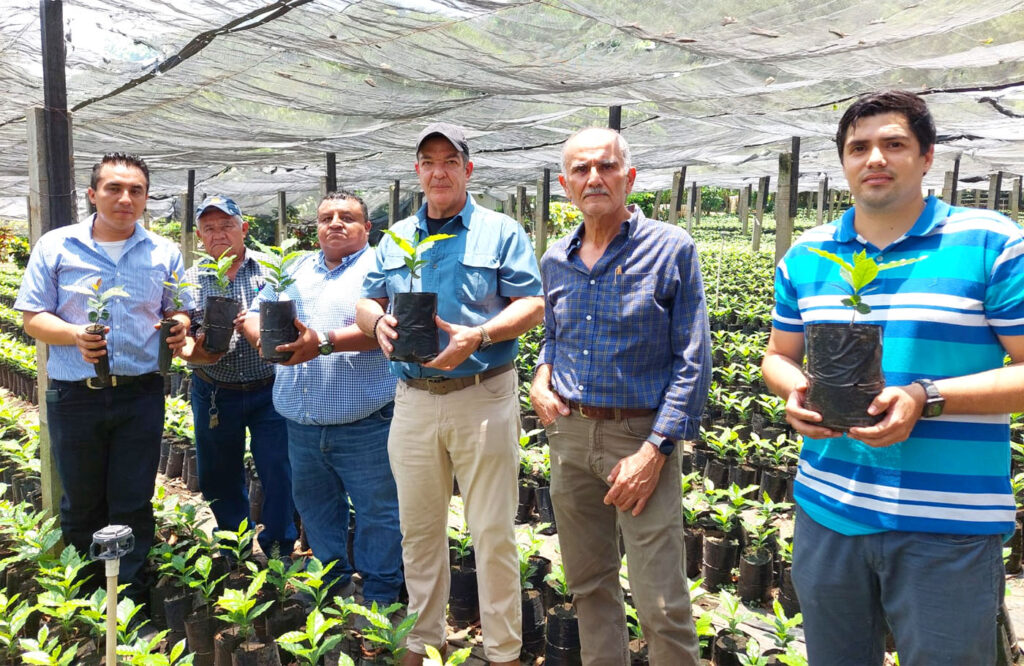USDA and MOCCA, support the WCR Verified program for large nurseries, by increasing the supply of quality planting material in 5 countries.
The renewal and establishment of areas using verified seeds is expected to help reduce disease management costs and increase productivity.
September 21, 2022. San Salvador, El Salvador
Selecting the right variety is the starting point of a bond that can last up to 30 years between a producer and his coffee plantation, but what happens if the varieties bought are by nature (genetics) not very productive and weak to diseases? The plantation management costs could exceed the benefits and compromise the profitability of the producing family for generations.
Pedro López, a native of Santa Ana, El Salvador, who has been involved in coffee growing since the 1990s, has learned the hard way the costs associated with poor selection of planting material.
“I used to buy seeds to renew them in cheap seedbeds, but I lost out. For 10 years, I sowed the plants, but they had root problems, others were diseased, and soon after sowing, up to 30% of them died”.
Pedro López, Coffee producer, Santa Ana, El Salvador

Don Pedro recalls that productivity levels were also low,so, in urgent search of a solution, he looked for better-performing seeds and plants, until he found the J. Hill Nursery, a company that, in 2022, received verification for the Borbon and Sarchimor T5296 varieties from World Coffee Research, leader of the coffee research component of the MOCCA project.
The coffee supply chain does not start at the farm, it starts with the seed
“The success or failure of a coffee farmer’s plants is the basis of the family’s livelihood.To be successful, coffee farmers need healthy seeds and plants that conform to their expectations,” said Salvador Urrutia, Director of World Coffee Research.
“WCR Verified is an independent program based on the principles of the ISO 17065 standard that follows the “four eyes” audit concept, meaning that four eyes see more than two eyes, to certify the production processes on parent farms andthe authenticity and health of coffee seeds, both in vitro and in plants,” Urrutia explained.
Within the framework of the MOCCA project, WCR, as a leader in coffee research, has supported more than a dozen large nurseries in 5 countries, providing advice on practices, procedures and improvements that must be implemented to achieve the WCR Verified standard. Some of these activities include:
● Internal assessments to define the nursery’s status in relation to the standard’s compliance criteria.
● An action plan according to the nursery’s physical condition.
● Follow-up and internal evaluations to monitor compliance with the action plan.
● Training of the nursery team in the preparation and control of traceability records.
● Support and follow-up in the process of coordinating the final audit with NSF.

Why does seed certification matter?
For most crops around the world, seed certification programs ensure that when purchasing seed or seedlings, growers receive healthy, well-fed, undamaged, disease free, and pest-free plants capable of surviving when transplanted on the farm. These certification programs also provide assurance that the farmer is receiving the correct, genetically pure variety that will produce the expected yields.
Given the 2012 rust crisis that affected nearly 600,000 hectares of coffee in Central America, it is estimated that close to 300,000 coffee growers need to renew their plantations. As is well known, the renewal of a plantation must be a constant year after year, so obtaining certified planting material is the most recommendable option to carry out this activity.

Different generations and the same perspective
Both Don Pedro (71) and Gabriel Medrano (38) agree that the productivity levels of their farms have increased between 25 and 30%, thanks to the use of verified seeds. “This increase in production means higher profits for us,” said Don Pedro.
“We have seen great benefits not only in increased production, but in the plants’ resistance to disease. These plants have a root system that makes them even more resistant to water stress,” said Gabriel, whose family has been dedicated to coffee growing for five generations.
Gabriel Medrano, Coffee producer, Santa Ana, El Salvador
J. Hill “Love for Coffee”
Cuando WCR lanzó la norma de veri
When WCR launched the WCR Verified verification standard in 2015, J.Hill Nursery was one of the first nurseries to participate and receive the WCR Verified certificate for the Marseillaise variety. The company is committed to research as an elemental strategy for the sustainability of coffee farming.
“Everything starts at the origin of the seed. A quality plant and good agronomic management ensure the investment of coffee growers,” said J. Hill President Roberto Augspurg.
“Sadly, not all growers give due importance to this issue, in relation to the fact that the investment in establishing or renewing is a long-term investment. With J. Hill, we always try to look for varieties that are genetically good to ensure the life of a plantation up to a 30-year investment,” he added.
The World Coffee Research Certification Program, also known as WCR Research or WCR Verified, is designed to provide independent, science-based quality control from the beginning of the coffee seed supply chain. With the support of MOCCA and the U.S. Department of Agriculture, WCR is driving the verification of 25 coffee seed nurseries, and is also promoting the verification of 25 large-scale nurseries in Guatemala, El Salvador, Nicaragua, Honduras and Peru.
With support from MOCCA, the cost of DNA analysis was paid as a matching fund to the total cost of the process assumed by the nursery, and 50,400 plants of the Borbon and Sarchimor T5296 varieties were genetically verified.

Acerca de
J. Hill Coffee Company: J.Hill and Company is a coffee producer and marketer founded in 1896, and is located in the municipality of Santa Ana, El Salvador. For more than 125 years it has been a leader in coffee production and has maintained an unparalleled relationship and collaboration with the producers of this region. J Hill y Cia offers services to its producers in each link of the production chain, starting with the preparation of coffee seedlings, to the administration and supervision of the farms. It also provides certification management services, coffee quality improvement through good agricultural practices, and coffee export services.
WCR: World Coffee Research is a pre-competitive, multi-stakeholder platform that enables the global coffee industry to invest in advanced agricultural research and development to transform coffee production into a profitable and sustainable livelihood. WCR leads MOCCA’s activities related to large nurseries, as well as research and dissemination activities in coffee.
TechnoServe: In 2020 TechnoServe received the award for “Coffee Support Organization of the Year” by the National Coffee Association of the United States (NCA). TechnoServe operates in 29 countries, linking people to information, capital, and markets, and has helped millions of smallholder farmers and entrepreneurs create lasting prosperity for their families and communities. TechnoServe is the MOCCA Consortium Leader and leads the coffee program.







